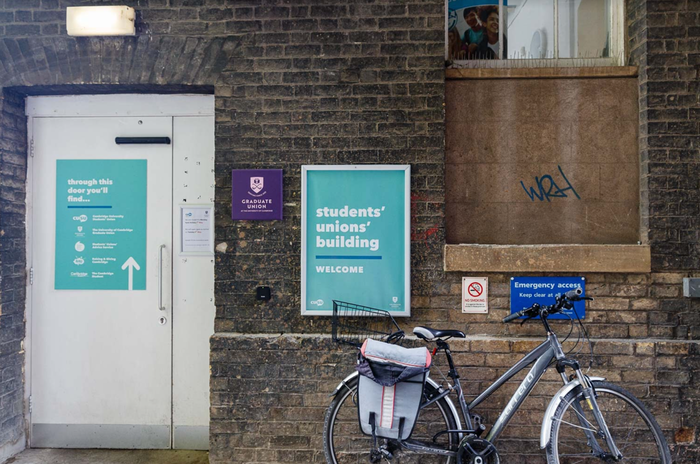
SU hopefuls make their pitch to students
The reading week loomed large over yesterday’s hustings

Those hoping to represent Cambridge students next year made their pitch to voters yesterday (28/2) on a forbiddingly cold and wet evening.
The three-hour hustings centred on longstanding concerns in SU politics - sustainability, decolonisation, access, and welfare - as well as the reading week, on which a referendum is being held alongside the elections.
There were few fireworks or fundamental disagreements. The phrase “I agree with all of that” was uttered countless times when candidates answered a question in turn.
Just thirteen students are going for the thirteen positions up for grabs, with four jobs - including Postgraduate Access, Education and Participation Officer - getting no candidates at all. Of the remaining nine elections, three are uncontested. University Counsellor is the only race with more than two runners.
Candidates were supposed to be fielding pre-submitted questions sent in by students, but one of the moderators admitted that they’d been made up just before proceedings got under way. Newnham’s Lucia Windsor Room, where the hustings were held, was less than half-full.
Zaynab Ahmed and Zak Coleman, who are facing off to be the next Undergraduate President, were pushed on how to buck the apparent trend of students caring less and less about the SU.
Ahmed said that she hoped to increase participation in bodies such as the student council, while Coleman said that opening a café and bar in the new SU building would reconnect students with their representatives.
Three candidates this year - Ahmed and Coleman for Undergraduate President, and Amelia Jabry for Postgraduate President, have also already served as sabbatical officers for one year.
They all argued that their experience was a plus, that they had a rapport with University management and would now be able to bring deep, structural change in a second term.
One attendee, however, queried if people who hadn’t studied in twelve months could really remain in touch with students. Coleman conceded that “there shouldn’t be any complacency within the SU”, even regretting that many roles aren’t “hotly contested this year”.
Getting a reading week has been at the fore of the SU’s work for a number of years - yet it’s one of the issues where Coleman and Ahmed differed most.
Coleman, who has put it at the heart of his manifesto, argued yesterday that the next “six to ten months” are vital for the proposal, and that his experience of lobbying on the issue makes him best placed to get it over the line. Needless to say, he endorses the “Yes” campaign in this week’s referendum.
Ahmed doesn’t mention the words “reading week” in her manifesto once. While she supports the proposal personally and campaigned for it as Undergraduate AEP Officer this year, her campaign has not officially backed “Yes” in the referendum. She argued that remaining neutral will allow her to better represent students.
The most fiercely contested position is University Councillor, with Eve Blain, Ruari McColl and Sam Carling all vying for the job. Carling was absent from yesterday’s hustings due to illness, but underlined a commitment to working across JCRs and MCRs to deliver change in a pre-recorded video.
Blain and McColl expressed a slightly different view of the role, which consists of representing student interests on the University Council, and is not affiliated with the SU. McColl said he would set up an email for University Councillor for students to send in their views, while Blain stressed that they would go on their own convictions as well as canvassing student opinion.
Another contested position was Women’s Officer, where candidates Eseosa Akojie and Marina McCready differed significantly in their policy objectives. Akojie said that if she could have only one priority it would be to “create a sense of community” among students of marginalised genders; McCready countered by saying that “basic safety needs” needed to be addressed before anything else.
Neve Atkinson and Lily Ingram - both running to be Undergraduate AEP officer - agreed that “access and education are fundamentally linked”, but differed in their attitudes towards the strikes.
Ingram expressed her “wholehearted support” for the strikes, while Atkinson gave a more nuanced position, agreeing that “an academic’s working conditions are our learning conditions” while cautioning that “students’ needs are diverse” and consultation with the student body would be salutary.
The evening came to a farcical end when a scheduled “debate” on the reading week fell flat as not one figure from the “No” campaign, who are yet to publish a manifesto, could be found to present its case.
This article was edited on 2/3 at 10:20 to clarify Zaynab Ahmed’s position on the reading week.
 News / Under 3% of applicants for Cambridge academic jobs are successful7 April 2025
News / Under 3% of applicants for Cambridge academic jobs are successful7 April 2025 News / News in Brief: cats, Camelot, and construction woes6 April 2025
News / News in Brief: cats, Camelot, and construction woes6 April 2025 Comment / Cambridge’s gossip culture is a double-edged sword7 April 2025
Comment / Cambridge’s gossip culture is a double-edged sword7 April 2025 Lifestyle / Which college brunch should be next on your list?6 April 2025
Lifestyle / Which college brunch should be next on your list?6 April 2025 Sport / Previewing the 170th Boat Race7 April 2025
Sport / Previewing the 170th Boat Race7 April 2025







